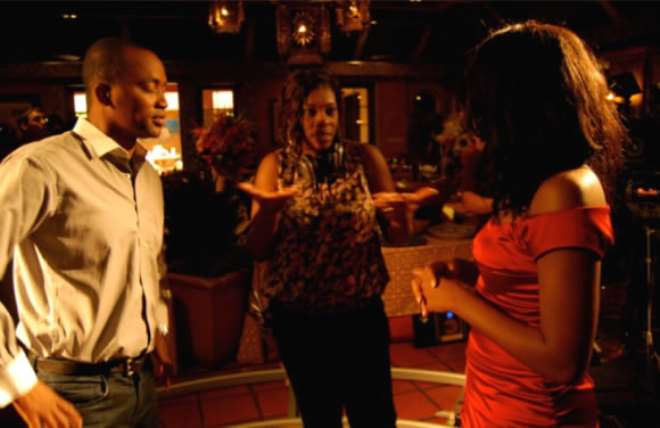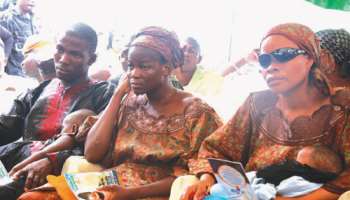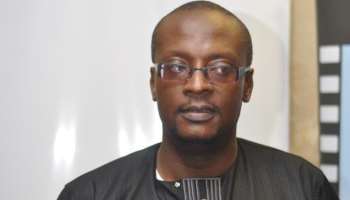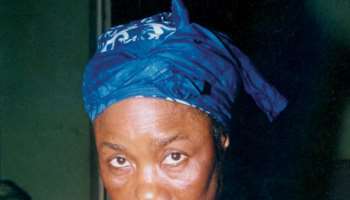Q & A WITH JOY DICKSON – DIRECTOR Between Kings and Queens
When did you first decide you wanted to be a filmmaker?
“Well, it started in Africa a long time ago, for as long as I can remember. As a teenager, my Dad used to buy a lot of films, and so eventually we had a lot of videotapes. I would sit down and watch a lot of Indian films, Chinese films, and horror films.
“As I was watching, I was imagining, “Hmm, I wonder what this person was thinking while doing this?” That's when I first realized I could actually make up stories myself. So you could say my filmmaking career started way, way back in Africa.”
What was the greatest challenge while filmmaking in Nigeria?
“Piracy was a challenge. Also, the lack of proper film equipment in Nigeria was a huge challenge. I once saw a movie that was shot on a track and I was really impressed. But come to find out, that film was shot in Ghana. In Nigeria, when they wanted to create a tracking shot, they just used a hand held and I mean obviously, you can tell the difference. So the technical know-how was definitely a challenge in Nigeria. “
What was it like filming “Between Kings and Queens” in Austin, Texas?
“It was wonderful in the sense that I worked with people who had the same passion and who were willing to make a lot of sacrifices on set. Considering the amount of locations we needed and the budget, we had to maneuver around many obstacles. I was fully conscious of what I was doing. I was fully aware of my environment and I really wanted this movie to go a lot higher than my previous work.
“During production, we had to shut down an entire road to shoot a scene and thanks to Austin we were able to do it. I hope Austin continues to help promote independent films. For an independent film, we would not be able to shut down an entire street in Los Angeles.”
What was your most memorable moment on set?
“My memorable moment was when we were doing the roof scene. As I was writing the story, it was one of the scenes that I really, really wanted to see come to life. The moment when I saw them on the roof, acting out that scene, was very beautiful for me.
What were some of the obstacles along the way?
“Getting financed was one of the major obstacles. When we first wanted to do this film, the people that said they would come up with the finances were not able to pull through. Discouragement came then, but what could I have done? Keep on writing. My husband has been the single greatest encouragement I've ever had. The main thing that kept me going was the constant encouragement from him.
SUSAN – Do Africans really live in trees?
Where does that question come from?
“Many years ago, my friend Amade was two weeks away from graduation from film school here in Austin. A fellow student said to Amade, “I heard in Africa, you guys live in trees.” Amade said, “Yeah, yeah, yeah, we live in trees. The rich live in tall trees and the poor live in small trees,” and the student said, “Really?” Amade replied, “Yes, you remember when Clinton came to Africa? We kept him in one of the tallest trees!” The student still believed him, and said, “Really?”
“Personally, (laughter) I think you must be a fool to believe that. I mean, for someone who's graduating in two weeks, at least he should know a little bit more about the world he lives in. So when Amade was telling us that story (laughter), my husband and I just laughed and laughed and laughed. Amade is now the main editor on the film. “
What was it like working with Jim Iyke: actor, African movie star
“Funny, funny, funny. He was a very funny guy. He got the script two days before he arrived on set and he knocked it off. It felt so good working with him. He made everyone crack up constantly while we were shooting.”
Your DP was Michael Morlan, whose credits include numerous music videos and films, including the 2008 Oscar nominated
documentary, “Operation Homecoming: Writing the Wartime Experience.
What was it like working alongside him during production?
“He was fantastic. He was very professional; very, very professional. He went the extra mile. Even with the lighting guys who didn't have as much experience as he had, he was willing to share and help out.”
Do you have any upcoming projects you'd like to tell us about?
“I'm in pre-production for two projects: Chameleon and The Preacher's Kiss. I'm still developing The Preacher's Kiss, but the script for Chameleon is done. I'm looking forward to this project because it is really going to define how far I will go in this industry.”
Where do you see the future of independent film?
“Independent film is going to go a long way. I feel there is hope. In terms of independent filmmaking, you try as hard as possible despite having the idea in your head that you're competing with big studios. You try to tell your story in a very simple form for people to understand. That's why you're an independent filmmaker. Somebody's not telling you, 'You have to change this around to suit what we think is right.'
“The beauty of being an independent filmmaker is that you are able to tell your story the way you see fit. I heard with Tyler Perry, they were telling him to do certain things, but he felt like he wanted to tell his story a certain way, and he has done so well. As time goes on, I also think it will come to a point with the HD camera, that films will start being releasing in DVD form, not in film reel form.”
Latest News
-
 Actress Biodun Okeowo Celebrates Lege Miami On His
Actress Biodun Okeowo Celebrates Lege Miami On His -
 Davido's 'With You' Ft Omah Lay Official Video Hi
Davido's 'With You' Ft Omah Lay Official Video Hi -
 "I'm Ready For My Next Husband" - Ka3na Reveals
"I'm Ready For My Next Husband" - Ka3na Reveals -
 "I Humbly Suggest You Bring Back The Cashless Poli
"I Humbly Suggest You Bring Back The Cashless Poli -
 Yul Reacts To Photo Of New Born Daughter Being Use
Yul Reacts To Photo Of New Born Daughter Being Use -
 Burna Boy Reveals That He Is Considering Having Ki
Burna Boy Reveals That He Is Considering Having Ki -
 "Nollywood's Growth Requires Sacrifices From Curre
"Nollywood's Growth Requires Sacrifices From Curre -
 "Everyday With You Is A Blessing" - D'banj Celebra
"Everyday With You Is A Blessing" - D'banj Celebra -
 Nkechi Blessing Flaunts New Man On Social Media, D
Nkechi Blessing Flaunts New Man On Social Media, D -
 Yhemolee Celebrates Son As He Clocks Six Months
Yhemolee Celebrates Son As He Clocks Six Months














